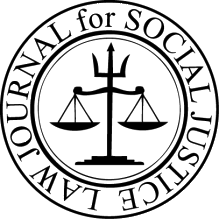VOLUME III, FALL 2012 | Legally Gay, The Symposium Issue
The 2012 Law Journal for Social Justice symposium, Legally Gay, brought together speakers from around the country in a discussion touching on the wide range of legal issues affecting the American LGBT community. The symposium itself included speakers from a diverse set of backgrounds, from the General Counsel of the Equal Opportunity Employment Commission (EEOC) to the director of outpatient services at a major Arizona hospital. In addition to law professors from around the country, the discussion included professors of Religious Studies, Justice & Social Inquiry, and Chicano/a Studies, and practicing lawyers from the fields of taxation, immigration, and estate planning. Similarly, the written product of the symposium features a diverse collection of topics and writers, making it a unique look at the legal and sociopolitical landscape for LGBT persons in America in 2012.
The greatest success of the symposium was its diversity of perspectives. The varied backgrounds of our speakers enriched the quality of the conversation, and we hope you’ll think the same thing of the written product: Volume III, Fall 2012 | Legally Gay, The Symposium Issue
Laura Clymer and Michael Malin
2012-2013 Editors-in-Chief, The Law Journal for Social Justice
Timothy Koch and Austin Gaylord
2011-2012 Editors-in-Chief, The Law Journal for Social Justice
Volume III, Fall 2012 Issue, by article:
Arguing About Families — Gay, Straight or Neither by Robert N. Minor
The Rhetoric of Same-Sex Relationships by Carrie Sperling
Public Schools as Workplaces: The Queer Gap Between “Workplace Equality” and “Safe Schools” by Madelaine Adelman and Catherine Lugg
One of These Things is Not Like the Other: An Analysis of Marriage Under the Immigration and Nationality Act by Regina M. Jefferies
Hate: An Examination and Defense of the Matthew Shepard & James Byrd, Jr. Hate Crimes Prevention Act by Jennifer Johnson
Marital Status and Sexual Orientation Discrimination in Infertility Care by Richard F. Storrow
Summer and Fall early releases:
“In Public Schools as Workplaces,” Adelman and Lugg call for an engagement between the market-based Workplace Equality Movement and the Safe Schools Movement to protect public school workers from anti-LGBT bias and discrimination. They write:
Public schools workers’ vulnerability to anti-LGBT bias and discrimination is not limited to direct surveillance of their identity or individual comportment, that is, who and how they are, but also indirectly based on what they are allowed to teach or discuss. This is because, in contrast to those who work in the business world, the public education workplace itself is a recognized battle site within the ongoing religious culture war.
Read the entire article: Public Schools as Workplaces: The Queer Gap Between “Workplace Equality” and “Safe Schools”
Professor Carrie Sperling examines how language choice can change the legal rights of same-sex couples. She writes:
In the civil rights context, our words heal, normalize, shift the debate, frame issues anew, and sometimes even cause disgust. Much of this happens outside our intentions and without our planning it, but it has profound effects on the legal rights we enjoy.
Read the entire article: The Rhetoric of Same-Sex Relationships by Carrie Sperling
Keynote speaker Dr. Robert N. Minor writes:
A lot of very bad arguments take place using the word “family.” By that, I mean they are based in falsehoods about the history and psychology of families. They are steeped in very creative, and current-position-affirming mythology, and void of what we historians call data. And they are found in every sphere, from religion to politics to law.
In fact, “family” is less a clear, established concept in popular discussion and more a multi-valent symbol akin to the American flag, the National Anthem, and apple pie. You can’t be against it, whatever it is, without losing elections, friends, and media attention.
Read the entire article: Arguing about Families – Gay, Straight or Neither by Robert N. Minor
VOLUME III, Spring 2013 | Law Journal for Social Justice
Editors’ Note: This is the first time since our journal’s inception that we have produced consecutive issues in a single academic year. We want to thank our authors for their thoughtful approaches to the law and for examining how the law impacts underrepresented segments of our population — from immigrants to the elderly, from child porn victims to family pets: VOLUME III, Spring 2013 | Law Journal for Social Justice
Thanks to our dedicated LJSJ staff members, and in particular, Executive Managing Editor Tara Williams and Executive Articles Editors, Janette Corral and Jose Carrillo.
Lastly, be on lookout for our Symposium Issue this fall. It features articles from our “Just/Justice: Valuing Fairness and Efficiency in the Criminal Justice System” Symposium held March 1.
Laura Clymer and Michael Malin
2012-2013 Editors-in-Chief, The Law Journal for Social Justice
Spring 2013 issue by article:
Wrongs Against Immigrants’ Rights: Why Terminating the Parental Rights of Deported Immigrants Raises Constitutional and Human Rights Concerns by Rachel Zoghlin
Funding the Healing: Getting Victims Proper Restitution in Child Pornography Possession Cases by Julia Jarrett
Conflict in the Courts: The Federal Nursing Home Reform Amendment and § 1982 Causes of Action by Susan J. Kennedy
The Limits of Guilt and Shame and the Future of Affirmative Action by Donald L. Beschle
Closing the Loophole on the ‘Equal Opportunity/Bisexual’ Harasser Defense by Jose Carrillo
Why the ALI Should Redraft the Animal Cruelty Provision of the Model Penal Code by Nicole Pakiz
